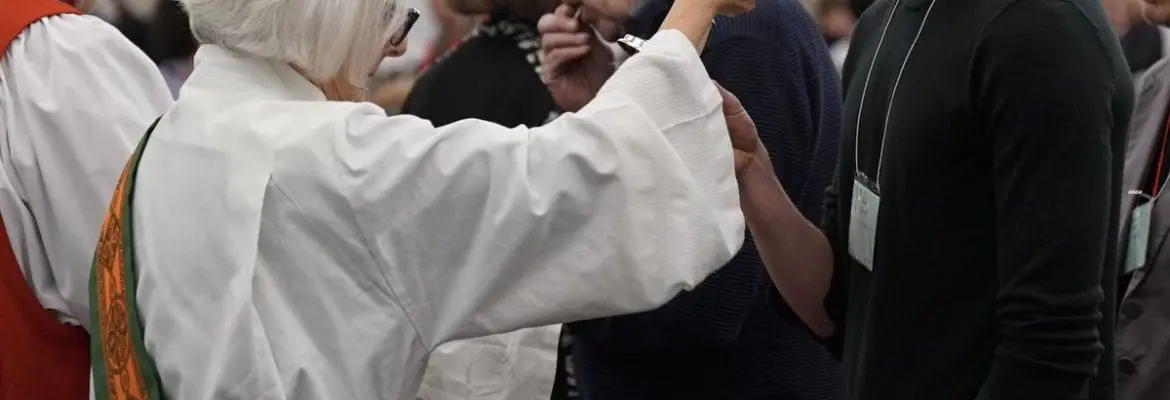
Synod begins with Eucharist
The Diocese of Toronto’s 158th Regular Session of Synod began on Nov. 9 at 10:30 a.m. with a Eucharist, which included an acknowledgment that it was being held on traditional First Nations land. The theme of Synod is “Growing in Christ,” which is also the name of the diocese’s strategic plan. The name is taken from Ephesians 4:15: “But speaking the truth in love, we must grow up in every way into him who is the head, into Christ.” Synod is being held at the Sheraton Parkway Toronto North Hotel & Suites in Richmond Hill. There were 611 voting and non-voting members in attendance when Synod started. Archbishop Johnson opened the business sessions with a prayer for Synod and a prayer for peace, noting that it was the 80th anniversary of Kristallnacht.
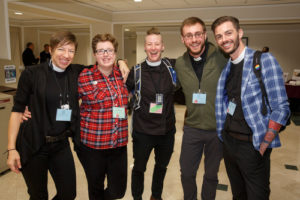
Social media wall shows posts
Back by popular demand, Synod has a social media wall – a large screen that shows a loop of posts about Synod from Twitter and Instagram. To see their posts on the wall, Synod members are using the hashtag #synodTO with their messages and photos.
Members practice electronic voting
As in previous Synods, members used electronic devices, called response pads, to vote. They were given instructions and asked three mock questions, to practice. In a light-hearted moment, Synod members were asked if they wanted the meeting to be adjourned. Seventy-one per cent voted in favour and 29 per cent were opposed.
Synod thanks sponsors
Synod thanked the following sponsors:
- Fiera Capital
- Letko, Brosseau and Associates
- Canso Investment Counsel Limited
- AON
- Northleaf Capital Partners
- Ecclesiastical Insurance
- M&M International
- The Dalton Company
- Trinity College
- Wycliffe College
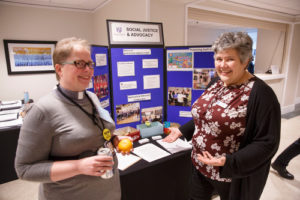
Parish nurses, chaplain on hand
Synod was informed that a small team parish nurses is on hand to attend to anyone in need of medical assistance. A member of the team will be on stand-by at the Media Table located at the back of the plenary room. Once again, the Rev. David Bryan Hoopes, OHC, is Synod’s chaplain. A chapel is available in the Stouffville Room on the lower level.
Synod votes for General Synod nominees
Archbishop Colin Johnson, who is chairing Synod, asked the General Synod nominees to go to the front of the room to be introduced. Synod will elect eight clerical and eight lay members to General Synod. Here are the nominees:
Clerical Members
- The Rev. Julie Burn – Church of the Resurrection, Toronto
- The Rev. Samantha Caravan – St. John, West Toronto
- The Rev. Greg Carpenter – St. Jude, Wexford
- The Rev. Susan Climo – Holy Spirit of Peace, Mississauga
- The Rev. Canon Dr. Philip Der – St. Christopher, Richmond Hill
- The Rev. Dana Dickson – Trinity Church, Bradford
- The Rev. Molly Finlay – All Saints, Whitby
- The Rev. David Giffen – Church of the Redeemer, Bloor St.
- The Rev. Canon Dr. Byron Gilmore – Christ Church, Brampton
- The Rev. Canon David Harrison – St. Mary Magdalene, Toronto
- The Rev. Canon Mark Kinghan – St. Paul, Uxbridge
- The Rev. Erin Martin – St. James the Apostle, Sharon
- The Rev. Graham McCaffrey – Grace Church, Scarborough
- The Rev. Louise Peters – St. James Cathedral
- The Rev. Canon Janet Read-Hockin – St. Nicholas, Birch Cliff
- The Rev. Mark Regis – St. Paul, Bloor Street
- The Rev. Canon Nicola Skinner – Grace Church, Markham
- The Rev. Dr. Alison Falby – St. Martin, Bay Ridges, Pickering
- The Rev. Mark Stacey – Christ Church, Woodbridge
Lay Members
- Mr. Chris Ambidge, ODT – Church of the Redeemer, Bloor St.
- Ms. Ann Arnold – St. Peter, Oshawa
- Ms. Joyce Badley, ODT – St. George by the Grange, Toronto
- Mr. Mario Bartolozzi – St. Matthias, Bellwoods
- Mr. James Beckwith – St. Peter, Erindale
- Mr. Craig Gustafson – Grace Church, Scarborough
- Ms. Leslie Hajdu, ODT – St. George, Pickering Village
- Ms. Nancy Payne – Christ Church, Woodbridge
- Mr. Ryan Ramsden – Grace Church, Scarborough
- Ms. Susan Schuschu, ODT – St. John, East Orangeville
- Ms. Marion Thompson – St. Mark, Port Hope
- Ms. Mary Walsh, ODT – St. John the Baptist, Oak Ridges
- Ms. Laura Walton, ODT – Holy Trinity, Clearview
- Ms. Christian (Kit) Woods – St. James the Apostle, Sharon
- Mr. Kennedy Marshall – Epiphany and St Mark, Parkdale
- Ms. Ainsley Munro – St. David Anglican Lutheran, Orillia
The election took place this evening and the results will be announced tomorrow.
The 42nd General Synod will be held from July 10-16, 2019 in Vancouver and the agenda will include the election of a new Primate; the Indigenous Church; and the proposed changes to Canon XXI on Marriage.
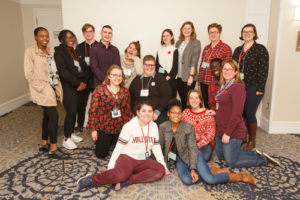
Missional & Outreach Moment #1
Throughout Synod, members are hearing about how the diocese is living out its vision in the Missional & Outreach Moments – how communities are moving beyond their walls to find new ways of meeting people who are not being reached by traditional forms of Church, and how our churches are reaching out to the poor, the marginalized and the homeless.
In the first Missional & Outreach Moment, Adam Furfaro spoke and showed a video about St. John the Baptist, Oak Ridge’s Community Missions Ministry. He spoke about the church’s new two-point strategy, to grow deeper in their relationship with Jesus Christ and wider by reaching out to people in the neighbourhood. “We unlocked and opened our doors to the community,” he said, adding that hundreds of new people visited the church in the following year. He spoke about a grant that the church received from the diocese and what they spent it on, including a community garden. He spoke about a homeless man arriving in June and how he has become the church’s property manager. The church has a service just for 18-23 year-olds.
Synod starts Marriage Canon Dialogue
Archbishop Johnson, Bishop Andrew Asbil and the Rev. Joyce Barnett gave a presentation about the Marriage Canon Dialogue. Here is a summary of their presentation:
The proposed changes to the Marriage Canon to incorporate a provision for marriage of same-sex couples in the Anglican Church of Canada were brought before General Synod 2016 for the first of two readings, and the motion was carried with a two-thirds vote in each of the three houses.
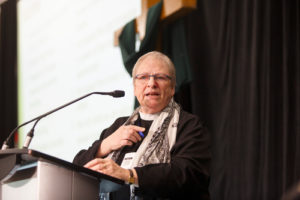
In preparation for the second vote in the summer of 2019, General Synod’s Declaration of Principles (section 11(c), requires that proposed alterations be referred for consideration to diocesan and provincial synods. Consideration does not mean vote; it means prayerfully considered.
We began this work at Synod 2017. Guided by the Canon XXI Working Group (an ad hoc group of clergy and lay people with diverse perspectives, chaired by Marge Watters-Knebel, a member of the Evangelical Lutheran Church in Canada), a process was developed whereby Synod was asked to identify what would be most helpful to prepare it for this consideration. We collected and collated 530 suggestions.
In response to these:
- Facilitation for parish-based listening processes was made available and a few parishes have asked for, and received, this support.
- Resources and information documents were posted on the diocese’s website. They include:
Same-Sex Unions – A Brief Survey of the Conversations
A history of the dialogues, decisions and key moments in the Church’s discernment process.
Authority in the Anglican Communion
An explanation about how the churches of the Anglican Communion try to come to a common mind.
National and International Views
A summary of national and international views concerning same-sex marriage.
Annotated Bibliography
An updated bibliography of key resources using the annotated bibliography from the Marriage Commission Report.
A Word About Facilitated Dialogue
A resource to help Anglicans have facilitated conversations.
However, by far the greatest response was a deep desire for prayerful, respectful, and honest listening and dialogue across our differences in ways that can build understanding and relationships. This listening would be mindful of LGBTQ2 voices. It is this request for gracious listening that shapes our work together, both at the Pre-Synod meetings and now at Synod itself.
The process we are using was also used at the recent Provincial Synod and at the House of Bishops and allowed for the expression of our shared values for continuing to walk together, in need of each other, regardless of the outcome of the vote in 2019.
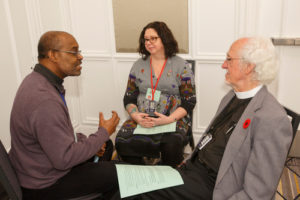
We enter this listening process today knowing that there are many people here who have already experienced years of this discussion and are feeling exhausted and frustrated by doing this again. However, there are also those who have not had the opportunity to have conversations like these – who have not had the opportunity to listen to people whose commitments are profoundly different than their own.
At Synod and previously at the Pre-Synod meetings, our work is to suspend our suspicions and open ourselves to finding a deeper understanding of what you and others feel and think about the potential changes to the Marriage Canon and to how we can value and sustain relationships in a time of disagreement.
From this sharing and listening, we will gather what we’ve heard into our diocese’s message for the Council of General Synod when it meets on Nov. 23-25, and to General Synod itself.
This is what we are considering:
- Declare that Canon XXI (On Marriage in the Church) applies to all persons who are duly qualified by civil law to enter into marriage. (This is an interpretation of the Canon, not a change to the Canon.)
- Change wording to be gender neutral (i.e. “the parties to the marriage”).
- Opt-in process. (Noting that no cleric is required to marry anyone.)
- Must be authorized by the diocesan bishop.
The purpose of our time together is to listen to each other, to invite a deeper understanding of what you and others feel and think about the potential changes to the Marriage Canon, and how we can value and sustain relationships in a time of disagreement. This conversation can trigger deep emotions for many, so we will be attentive to both the feeling and the factual substance of our conversations. These norms for our conversations will help us do this. To help us listen across our differences with respect:
- We grant that as people of faith we are all sincere our beliefs, including our reverence for Holy Scripture.
- We are neighbours now and we will continue to be neighbours after General Synod’s decision is made.
- We know that people of diverse sexuality and gender identities are present.
- We value inclusion and will strive for greater understanding of each other.
- We will speak in the first person. We will use “I” statements rather than “they” or “everyone”.
- We will not use language known to be offensive to others.
- We respect the right of people to speak of their own experiences.
- We respect the privacy of others. What others say is their story to tell, not yours.
- We will ask no questions that we are not prepared to answer ourselves.
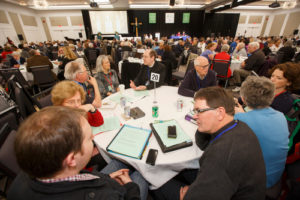
Bishop Asbil explained the next stage of the process. He asked Synod members to have conversations in groups of three, with people they didn’t know, both clergy and lay. He asked each group to do the following:
- Introduce yourselves and choose a time-keeper.
- Pray the Grace.
- Each person will speak without interruption for up to seven minutes.
- In turn, each person answers the two questions.
- The others may ask questions for clarification after each speaker’s allotted time.
- After all three have spoken – as a group summarize what you have heard.
- Close with the Doxology.
In groups of three, Synod members were asked to answer the following questions:
- What would you like to say to the group about the proposed changes to the Marriage Canon? What are your hopes and fears?
- No matter the results of General Synod’s vote in summer 2019, it will be met by both joy and hurt. How can we face this? What does it mean to be a diverse people of God?
Synod members met twice this afternoon in groups of three to answer these questions. Tomorrow morning, a volunteer will be assigned to each table to capture what is heard.
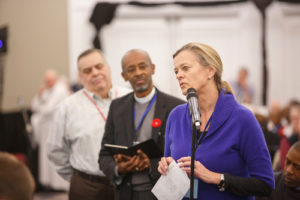
Synod votes on motion to revise election requirements
Synod considered a motion that proposed amendments to sections 10 and 11 of the Constitution, which deal with the way bishops are elected. The amendments would require a diocesan bishop or coadjutor bishop to be elected by two-thirds of the total votes cast in both the Order of Clergy and the Order of Laity. (Currently, only a majority of the total votes cast in each order are needed for the election of a bishop.) Furthermore, the name of the candidate with the lowest number of votes in the combined orders would be eliminated in each round of voting, except when there are fewer than four candidates remaining or the candidate with the lowest total number of votes in the combined orders received 10 or more votes in each order. (A side-by-side comparison of the relevant sections of the Constitution as currently worded versus the proposed words is in the Convening Circular.) The proposed changes apply only to the election of a diocesan bishop or a coadjutor bishop; the election of a suffragan bishop would continue to require a simple majority in each order.
The motion came before Synod last year but did not achieve the 75 per cent approval that is required to amend the Constitution at one Synod. (It received 68 per cent approval.) It came before Synod again today needing a simple majority and the assent of the Archbishop to pass. Synod debated the motion. As part of the debate, Archbishop Johnson exercised his constitutional prerogative to speak, arguing against the motion. When Synod voted, the motion failed by a large margin.
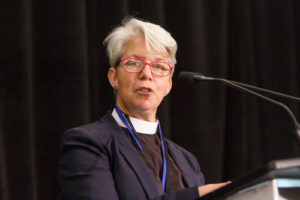
Missional & Outreach Moment #2
The Rev. Sheilagh Ashworth told Synod about the Parish of Lloydtown’s country run in support of Pikangikum. Over eight years, it has raised about $20,000 for fresh water in Pikangikum. She spoke about the challenges facing Pikangikum, a First Nations community in northern Ontario, and the efforts of the Pikangikum Working Group to build infrastructure. The Lloydtown country run is held on the last Saturday in September. As part of the presentation, Synod watched a video about Pikangikum.
PWRDF marks 60th anniversary
William Postma, the executive director of PWRDF, informed Synod that the relief and development agency was celebrating its 60th year and gave several examples of its humanitarian work in Canada and other parts of the world with its agency partners. He said the PWRDF has a new streamlined approach to send money to emergency situations in Canada such as wild fires. He also showed a video about PWRDF. He thanked the diocese for a grant it received from the fundraising campaign Our Faith-Our Hope.
Synod members share thoughts during Members Time
During Members Time, Synod members spoke about a number of subjects, including:
- The elimination of nuclear weapons.
- Making disciples of Jesus Christ, and a resource for faith formation.
- The College of Preaching.
- The Parliament of World Religions and interfaith relations.
- Resources and services for homeless people
- Mental health for young people, especially for those aged 18-20.
- What it means to be humble.
- Canada’s national housing strategy and building affordable housing on church land.
- The assistance provided by Our Faith-Our Hope.
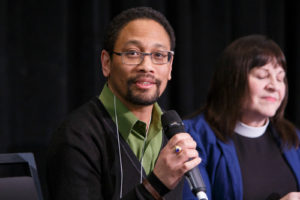
Intercultural working group makes presentation
Christina Yu, André Lyn and the Rev. Susanne McKim made a presentation about the Bishop’s Working Group on Intercultural Ministries, formed by Archbishop Johnson in 2014 to implement the recommendations in the report Being Multicultural, Becoming Intercultural. The speakers talked about the group’s work to date and its anti-racism workshops. Other initiatives the group is working on include:
- Formal adoption of the national church’s Charter for Racial Justice.
- A diocesan policy on hate crimes and discrimination.
- A more diverse governing body, both clergy and lay.
- Establishing stronger relationships with sister groups doing similar work in the national church, The Episcopal Church and the United Church.
- A standardized application process for bishops to approve “non-standard” liturgy for cultural congregations.
- Expansion of resources in other languages offered through the diocese’s website.
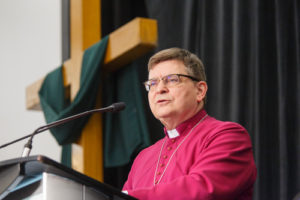
Archbishop Johnson, Bishop Asbil address Synod
Instead of giving a Charge to Synod, Archbishop Johnson provided a reflection. This is his last time chairing the Synod and he said it has been an honour and privilege to serve. He spoke about some of the changes that have taken place in the diocese since he was ordained more than 40 years ago, including: the increased role of the laity and deacons in the Church; the ordination of women; the creation of the Order of the Diocese of Toronto; the Our Faith-Our Hope campaign, which raised $40 million; the changing demographics of the diocese and the increase in Anglican services in different languages; and the creation of FaithWorks, which has raised $24 million for the needy. He said the most fundamental change in the diocese in the past 15 years has been missional work here. He thanked Synod members, and five people in particular: his wife Ellen; Canon Mary Conliffe; Chancellor Clare Burns; the late Canon Robert Falby; and the late Archbishop Terence Finlay.
Bishop Asbil, who is the diocese’s coadjutor bishop and will succeed Archbishop Johnson upon his retirement on Dec. 31, spoke about his first few weeks travelling around the diocese and visiting parishes. He praised the clergy, laity, College of Bishops and Diocesan Centre staff. He identified four areas of special interest: to see and make Jesus known; to walk together; to care for and advocate on behalf of creation; and to imagine new ways of being the Church when a building is no longer sustainable.
After a service of Compline, Synod adjourned for the day. It will resume tomorrow.